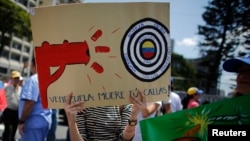Reports of shortages of cancer medicines in Venezuela are worrisome, a doctor representing the World Health Organization's Americas arm in the scarcity-hit country said in a rare interview this week.
Currency controls that crimp imports and a decline in local production have led to shortages of contraceptives, surgical equipment and medicine in the oil-producing country.
On Monday, a small group of children suffering from cancer protested with their relatives in front of the Children's Hospital J.M. de los Rios in Caracas over delays and interruptions in their chemotherapy.
"We're worried [over reports] that these medicines are missing," Dr. Celia Riera, a Cuban who represents the Pan American Health Organization in Venezuela, said in an interview.
Speaking at her office in eastern Caracas, Riera stressed the role of PAHO was "technical cooperation," not opining about health care in member countries.
During his 14 years in power, the late President Hugo Chavez tapped an oil bonanza to build thousands of free health centers in poor neighborhoods.
This helped reduce problems like infant mortality, but many relevant indicators have not been published since shortages worsened in recent years because of an economic crisis.
Many doctors, patients and rights groups now say the health sector is in an abysmal state, with overcrowded hospitals that lack everything from gloves to doctors, many of whom have left Venezuela as part of a wider brain drain.
About seven in 10 drugs are unavailable, the Pharmaceutical Federation of Venezuela estimates.
Miners, malaria, migration
Malaria cases increased 12 percent between January and October 2014 from a year earlier, according to the Health Ministry. The statistics, previously published weekly, have not been released since.
Riera said she was working with authorities to try to stem malaria in Bolivar state, a huge expanse of jungle and savanna brimming with legal and illegal mining for gold and diamonds.
The migrant miners sometimes do not complete treatment or bypass it altogether, and their frequent movements within Venezuela and to neighboring Brazil and Guyana heighten chances that the disease will spread.
"The strategy is to control it in the Bolivar area," said Riera.
PAHO is trying to increase nets and prevention in coordination with the government, she added. Mosquito-borne dengue is also an issue in tropical Venezuela.
Riera said PAHO was concerned about diabetes, arterial hypertension and cancer in Venezuela and the Caribbean region more generally.





